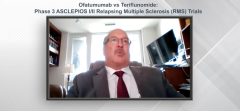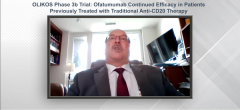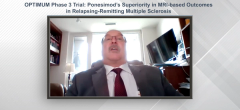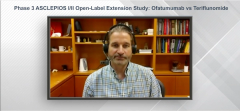
Impact of Results From the COVID-19 in MS Global Data-Sharing Initiative
Episodes in this series

Dr Bianca Weinstock-Guttman discusses the impact of the results from the COVID-19 in MS Global Data Sharing Initiative has on clinical practice.
Bianca Weinstock-Guttman, MD: This is important information that we should pay attention to. As practitioners looking at this data, we have to think about the importance of keeping the MS [multiple sclerosis] under control vs safety now during the COVID-19 [coronavirus disease 2019] period. For patients very active with inflammatory elements, relapses, and active MRIs, we will go for active and more efficacious therapy. However, for patients for whom anti-CD20s are also recommended, such as progressive and maybe older patients, we have to be more considering in this regard, especially because we know that aging and the increase in ability may increase the risk for COVID-19 complications.
Additionally, during this period of time, we considered that patients who are already on medication may maintain a benefit if we try to increase the period of time between the infusions.
A question being raised that we hoped we’d receive the answer to and get a vaccination is response to vaccine. Will the patients on anti-CD20 therapy be able to mount the response from vaccine as we expect to? That would be a different consideration that we’ll be looking into when we have these vaccines.
I can say that in our clinic— it may be different in other clinics—the patients with active relapsing-remitting disease who were initiated on ocrelizumab or are on Rituxan, if they have the so-called neuromyelitis optica, very active disease, we continued the therapy at a 6-month basis. Maybe we had a delay for 1 month, but before delaying we were evaluating their B cells, the CD19, and restarted with 1 or 2 months delay. This was only between March and April.
For patients we used the anti-CD20 therapies on—those with progressive disease—many of them were having higher disability and may be more aged. For older patients, we did delay therapy, and for a few of them we discontinued the therapy altogether. We were monitoring very closely patients with relapsing disease and active disease, and it’s easier to follow in preventing relapses and preventing MRI activity. For a patient with progressive disease, we are only trying to determine if they remain stable.
As mentioned, based on these data and on a previous consideration before obtaining the data, we did take in these measures and continue to do so. Very active patients, before starting on this medication, we continued with them. We had a very short period that we extended within March and April, but we’re now going back to every 6 months. For patients with progressive disease, we are considering increasing the timing between, and maybe even part of them discontinued therapy because of the concern.
Newsletter
Keep your finger on the pulse of neurology—subscribe to NeurologyLive for expert interviews, new data, and breakthrough treatment updates.

























